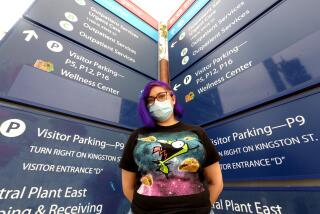Grieving Parents Seek Steps to Improve Clinics’ Security
- Share via
SACRAMENTO — Three weeks after the stabbing death of psychiatric social worker Robbyn Panitch, the dead woman’s grieving parents on Wednesday embarked on a lobbying campaign to bolster security at mental health centers, voicing hopes that something positive can come from the tragedy.
“We don’t want to just let it lay, let her be buried and forgotten,” Allan Panitch of Palos Verdes Estates, the slain woman’s father, said in a round of meetings with legislators and state officials who oversee mental health and law enforcement.
On Feb. 21, Robbyn Panitch, 36, was stabbed 31 times in her office at the Santa Monica West Mental Health Service. Charged with murder is one of her clients, David Scott Smith, 26, a transient, who told homicide detectives that he killed Panitch because he saw her as the “Antichrist” and felt frustrated that she was unable to assist him.
The slain woman’s parents--Allan and Gloria--spent the day trooping to legislative offices armed with a briefcase filled with documents about the crisis in funding for Los Angeles County’s mental health system, which they believe contributed to the tragedy.
The Panitches’ appeal was laced with soft-spoken stories about their daughter and her work with the mentally ill and occasional angry outbursts of criticism of the mental health system.
Gloria Panitch, a marriage and family counselor, emphasized that she was not motivated by revenge against her daughter’s assailant. “I’m not out to kill him . . . I just don’t want him on the streets to kill anyone else,” she said.
Limited Response
While the couple found sympathetic ears, they came away with few commitments. And they were turned down in a bid to see Gov. George Deukmejian.
Allan Panitch, a contract manager at Hughes Aircraft, voiced disappointment that he was unable to see Deukmejian. “It would have been, if nothing more, a gesture of respect to have seen us for a few minutes, respect for Robbyn,” he said.
Tom Beermann, the governor’s assistant press secretary, said Deukmejian was unable to fit the couple’s request into his schedule and referred them to D. Michael O’Conner, director of the state Department of Mental Health, with whom they met for an hour.
Her voice cracking, Gloria Panitch appealed to O’Conner, saying: “All you have to do is make a commitment for security . . . that’s all you have to do.”
Pledges a Review
O’Conner, a psychiatrist, expressed sympathy for the couple’s loss and said that he would review what role the state can play in improving security at mental health clinics. But O’Conner cautioned the couple that it is unclear whether he has authority to require counties to provide security for mental health workers.
Later, Dean Owen, a spokesman for O’Conner, said the director does not have the power to mandate minimum levels of security at county mental health facilities but does have “authority to make recommendations” to the state’s 58 counties.
The meetings with O’Conner and other state officials, including representatives of Atty. Gen. John K. Van de Kamp, were arranged by Assemblyman Tom Hayden (D-Santa Monica). At a press conference, Hayden said he expects to introduce legislation to enable mental health workers to reject clients they regard as too dangerous “in the absence of adequate security arrangements.”
Among the security precautions he suggested for clinics were installing silent alarms, locks or gates, hiring armed or unarmed guards and bolstering training on safety issues.
Current Spending
Francis Dowling, chief deputy director of the Los Angeles County Department of Mental Health, said the county would not oppose such legislation. He estimated his department already spends more than $1 million a year on security at mental health facilities and after Robbyn Panitch’s death, set aside an extra $250,000 for the next six months.
But Dowling acknowledged that, on the day Robbyn Panitch died, no special security precautions were in place in the Santa Monica office because it was “traditionally not thought to be a high-risk site.”
More to Read
Sign up for Essential California
The most important California stories and recommendations in your inbox every morning.
You may occasionally receive promotional content from the Los Angeles Times.













